Reflective Essay on the Stolen Generation & Cultural Safety
VerifiedAdded on 2023/04/11
|6
|1063
|93
Essay
AI Summary
This essay provides a reflective account of the Stolen Generation, employing Gibbs Reflective Cycle to analyze the personal learning experience and the continuing effects of this historical event. It begins with a description of the policies that led to the removal of Aboriginal children from their families between 1910 and 1970, causing trauma and cultural loss. The author reflects on their initial understanding of the Stolen Generation, evolving from a misunderstanding to a deep empathy and awareness of the injustices faced by the Aboriginal population. The essay critically evaluates the assimilation policy, its failures, and the psychological trauma inflicted upon the stolen children, highlighting the need for justice, equity, and respect for the rights of the Aboriginal people, especially in healthcare. The author concludes with an action plan, emphasizing the importance of advocating for the rights of Aboriginal people and learning from the experiences of the Stolen Generation to ensure culturally safe and equitable care.
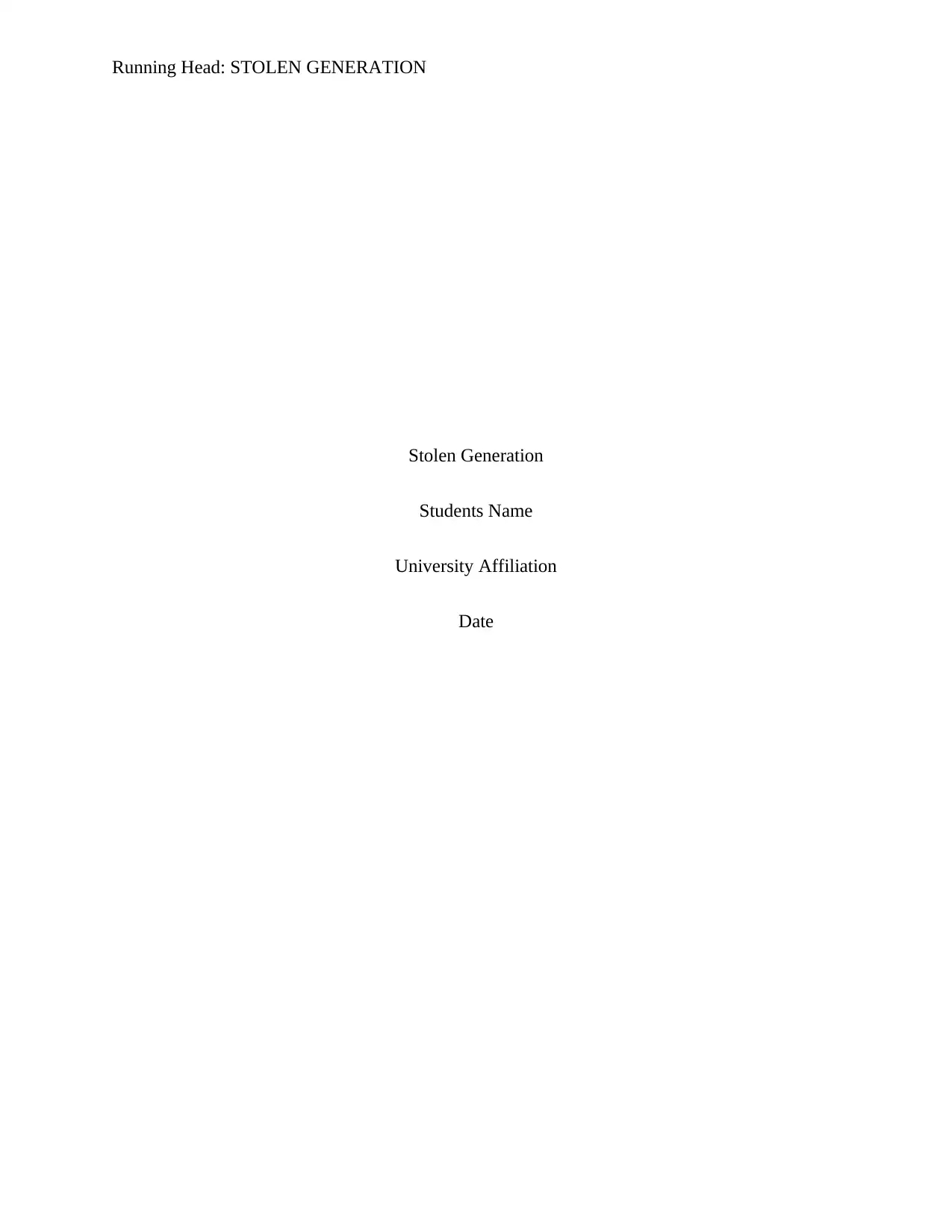
Running Head: STOLEN GENERATION
Stolen Generation
Students Name
University Affiliation
Date
Stolen Generation
Students Name
University Affiliation
Date
Paraphrase This Document
Need a fresh take? Get an instant paraphrase of this document with our AI Paraphraser
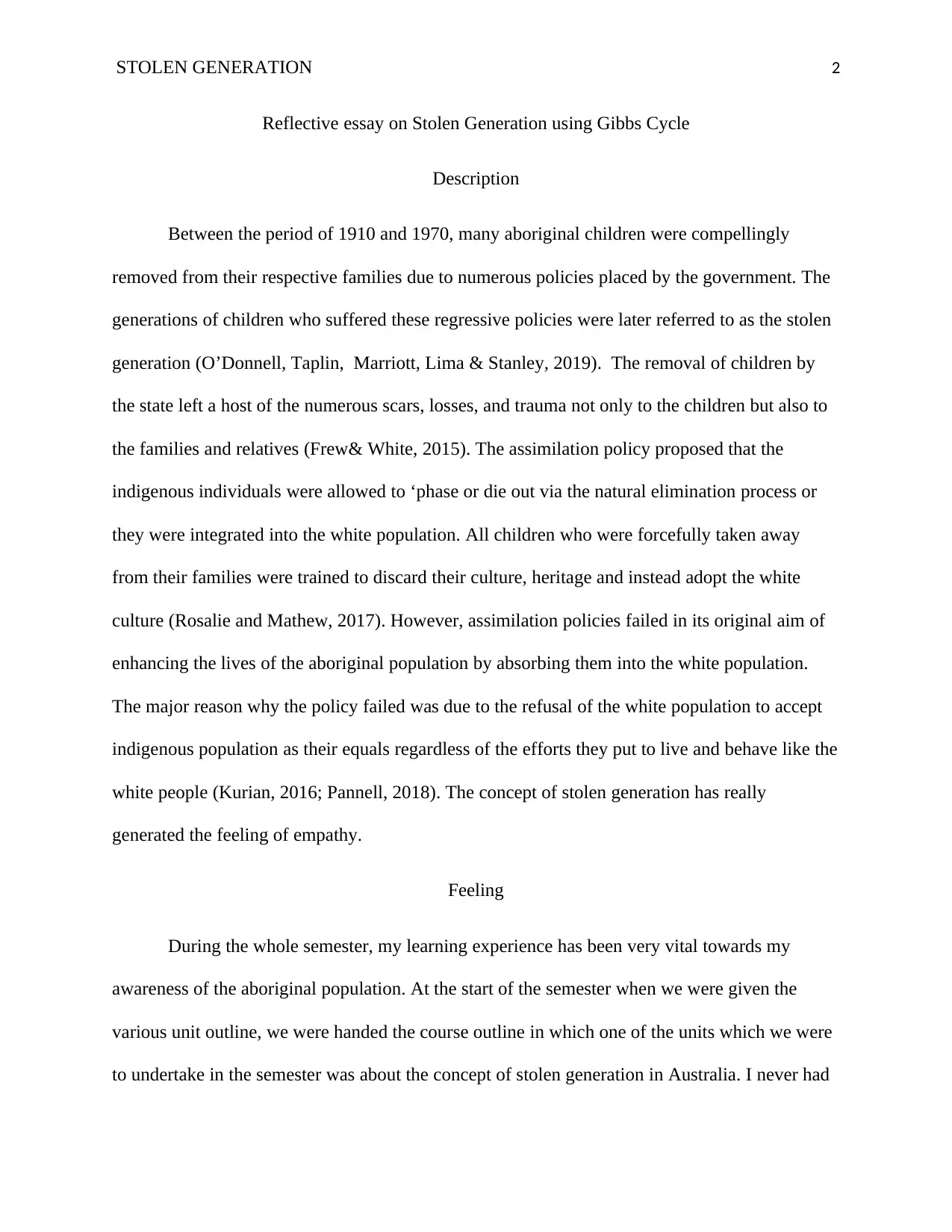
STOLEN GENERATION 2
Reflective essay on Stolen Generation using Gibbs Cycle
Description
Between the period of 1910 and 1970, many aboriginal children were compellingly
removed from their respective families due to numerous policies placed by the government. The
generations of children who suffered these regressive policies were later referred to as the stolen
generation (O’Donnell, Taplin, Marriott, Lima & Stanley, 2019). The removal of children by
the state left a host of the numerous scars, losses, and trauma not only to the children but also to
the families and relatives (Frew& White, 2015). The assimilation policy proposed that the
indigenous individuals were allowed to ‘phase or die out via the natural elimination process or
they were integrated into the white population. All children who were forcefully taken away
from their families were trained to discard their culture, heritage and instead adopt the white
culture (Rosalie and Mathew, 2017). However, assimilation policies failed in its original aim of
enhancing the lives of the aboriginal population by absorbing them into the white population.
The major reason why the policy failed was due to the refusal of the white population to accept
indigenous population as their equals regardless of the efforts they put to live and behave like the
white people (Kurian, 2016; Pannell, 2018). The concept of stolen generation has really
generated the feeling of empathy.
Feeling
During the whole semester, my learning experience has been very vital towards my
awareness of the aboriginal population. At the start of the semester when we were given the
various unit outline, we were handed the course outline in which one of the units which we were
to undertake in the semester was about the concept of stolen generation in Australia. I never had
Reflective essay on Stolen Generation using Gibbs Cycle
Description
Between the period of 1910 and 1970, many aboriginal children were compellingly
removed from their respective families due to numerous policies placed by the government. The
generations of children who suffered these regressive policies were later referred to as the stolen
generation (O’Donnell, Taplin, Marriott, Lima & Stanley, 2019). The removal of children by
the state left a host of the numerous scars, losses, and trauma not only to the children but also to
the families and relatives (Frew& White, 2015). The assimilation policy proposed that the
indigenous individuals were allowed to ‘phase or die out via the natural elimination process or
they were integrated into the white population. All children who were forcefully taken away
from their families were trained to discard their culture, heritage and instead adopt the white
culture (Rosalie and Mathew, 2017). However, assimilation policies failed in its original aim of
enhancing the lives of the aboriginal population by absorbing them into the white population.
The major reason why the policy failed was due to the refusal of the white population to accept
indigenous population as their equals regardless of the efforts they put to live and behave like the
white people (Kurian, 2016; Pannell, 2018). The concept of stolen generation has really
generated the feeling of empathy.
Feeling
During the whole semester, my learning experience has been very vital towards my
awareness of the aboriginal population. At the start of the semester when we were given the
various unit outline, we were handed the course outline in which one of the units which we were
to undertake in the semester was about the concept of stolen generation in Australia. I never had
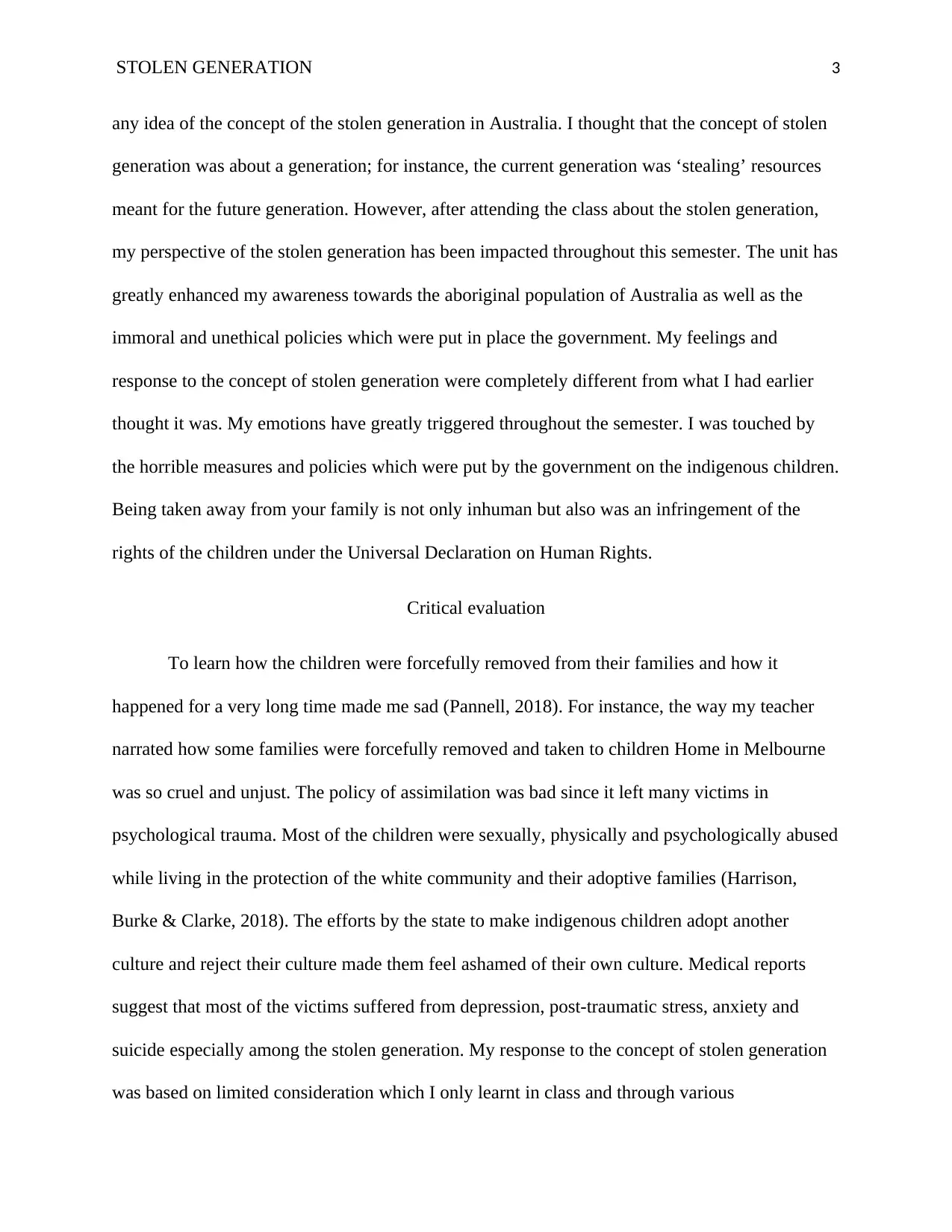
STOLEN GENERATION 3
any idea of the concept of the stolen generation in Australia. I thought that the concept of stolen
generation was about a generation; for instance, the current generation was ‘stealing’ resources
meant for the future generation. However, after attending the class about the stolen generation,
my perspective of the stolen generation has been impacted throughout this semester. The unit has
greatly enhanced my awareness towards the aboriginal population of Australia as well as the
immoral and unethical policies which were put in place the government. My feelings and
response to the concept of stolen generation were completely different from what I had earlier
thought it was. My emotions have greatly triggered throughout the semester. I was touched by
the horrible measures and policies which were put by the government on the indigenous children.
Being taken away from your family is not only inhuman but also was an infringement of the
rights of the children under the Universal Declaration on Human Rights.
Critical evaluation
To learn how the children were forcefully removed from their families and how it
happened for a very long time made me sad (Pannell, 2018). For instance, the way my teacher
narrated how some families were forcefully removed and taken to children Home in Melbourne
was so cruel and unjust. The policy of assimilation was bad since it left many victims in
psychological trauma. Most of the children were sexually, physically and psychologically abused
while living in the protection of the white community and their adoptive families (Harrison,
Burke & Clarke, 2018). The efforts by the state to make indigenous children adopt another
culture and reject their culture made them feel ashamed of their own culture. Medical reports
suggest that most of the victims suffered from depression, post-traumatic stress, anxiety and
suicide especially among the stolen generation. My response to the concept of stolen generation
was based on limited consideration which I only learnt in class and through various
any idea of the concept of the stolen generation in Australia. I thought that the concept of stolen
generation was about a generation; for instance, the current generation was ‘stealing’ resources
meant for the future generation. However, after attending the class about the stolen generation,
my perspective of the stolen generation has been impacted throughout this semester. The unit has
greatly enhanced my awareness towards the aboriginal population of Australia as well as the
immoral and unethical policies which were put in place the government. My feelings and
response to the concept of stolen generation were completely different from what I had earlier
thought it was. My emotions have greatly triggered throughout the semester. I was touched by
the horrible measures and policies which were put by the government on the indigenous children.
Being taken away from your family is not only inhuman but also was an infringement of the
rights of the children under the Universal Declaration on Human Rights.
Critical evaluation
To learn how the children were forcefully removed from their families and how it
happened for a very long time made me sad (Pannell, 2018). For instance, the way my teacher
narrated how some families were forcefully removed and taken to children Home in Melbourne
was so cruel and unjust. The policy of assimilation was bad since it left many victims in
psychological trauma. Most of the children were sexually, physically and psychologically abused
while living in the protection of the white community and their adoptive families (Harrison,
Burke & Clarke, 2018). The efforts by the state to make indigenous children adopt another
culture and reject their culture made them feel ashamed of their own culture. Medical reports
suggest that most of the victims suffered from depression, post-traumatic stress, anxiety and
suicide especially among the stolen generation. My response to the concept of stolen generation
was based on limited consideration which I only learnt in class and through various
⊘ This is a preview!⊘
Do you want full access?
Subscribe today to unlock all pages.

Trusted by 1+ million students worldwide
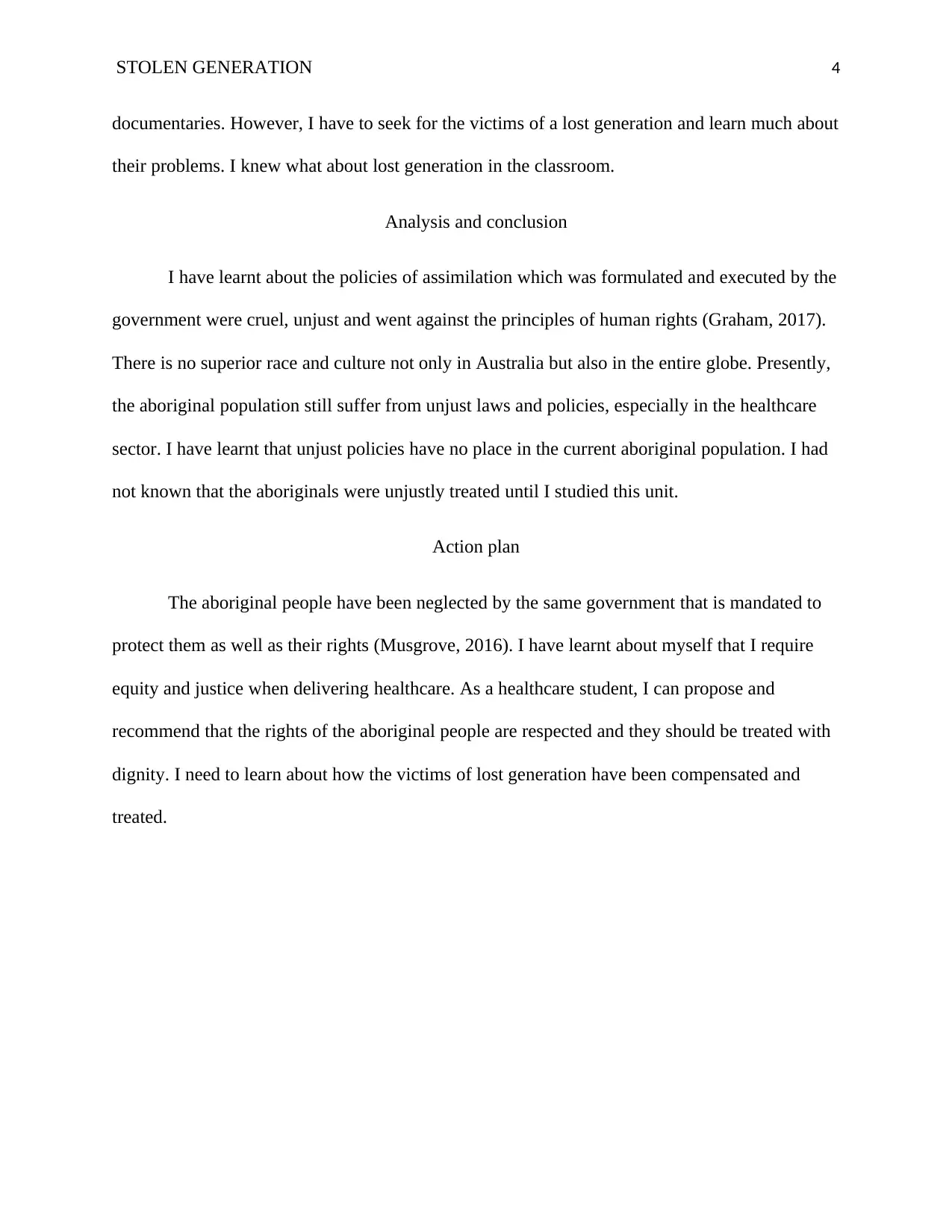
STOLEN GENERATION 4
documentaries. However, I have to seek for the victims of a lost generation and learn much about
their problems. I knew what about lost generation in the classroom.
Analysis and conclusion
I have learnt about the policies of assimilation which was formulated and executed by the
government were cruel, unjust and went against the principles of human rights (Graham, 2017).
There is no superior race and culture not only in Australia but also in the entire globe. Presently,
the aboriginal population still suffer from unjust laws and policies, especially in the healthcare
sector. I have learnt that unjust policies have no place in the current aboriginal population. I had
not known that the aboriginals were unjustly treated until I studied this unit.
Action plan
The aboriginal people have been neglected by the same government that is mandated to
protect them as well as their rights (Musgrove, 2016). I have learnt about myself that I require
equity and justice when delivering healthcare. As a healthcare student, I can propose and
recommend that the rights of the aboriginal people are respected and they should be treated with
dignity. I need to learn about how the victims of lost generation have been compensated and
treated.
documentaries. However, I have to seek for the victims of a lost generation and learn much about
their problems. I knew what about lost generation in the classroom.
Analysis and conclusion
I have learnt about the policies of assimilation which was formulated and executed by the
government were cruel, unjust and went against the principles of human rights (Graham, 2017).
There is no superior race and culture not only in Australia but also in the entire globe. Presently,
the aboriginal population still suffer from unjust laws and policies, especially in the healthcare
sector. I have learnt that unjust policies have no place in the current aboriginal population. I had
not known that the aboriginals were unjustly treated until I studied this unit.
Action plan
The aboriginal people have been neglected by the same government that is mandated to
protect them as well as their rights (Musgrove, 2016). I have learnt about myself that I require
equity and justice when delivering healthcare. As a healthcare student, I can propose and
recommend that the rights of the aboriginal people are respected and they should be treated with
dignity. I need to learn about how the victims of lost generation have been compensated and
treated.
Paraphrase This Document
Need a fresh take? Get an instant paraphrase of this document with our AI Paraphraser
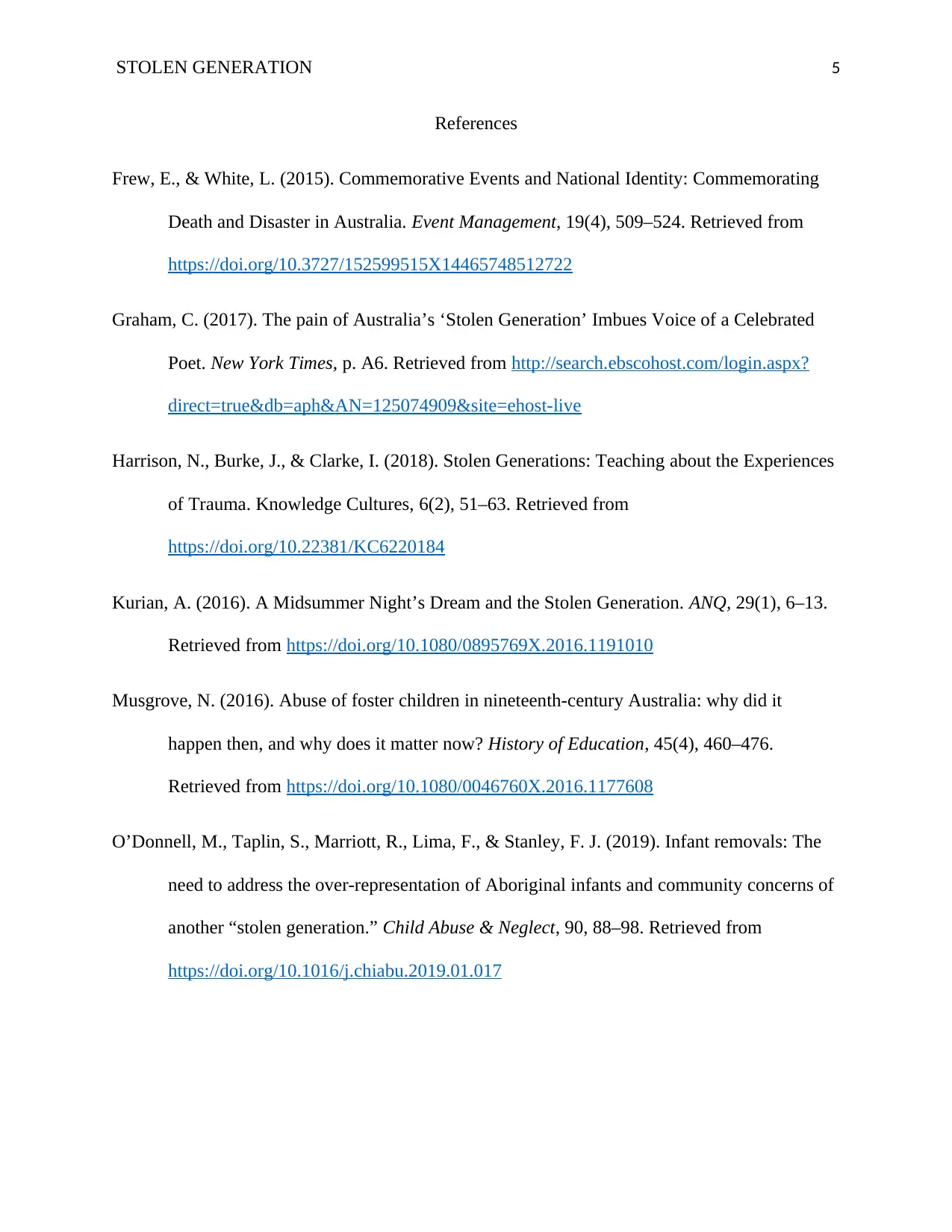
STOLEN GENERATION 5
References
Frew, E., & White, L. (2015). Commemorative Events and National Identity: Commemorating
Death and Disaster in Australia. Event Management, 19(4), 509–524. Retrieved from
https://doi.org/10.3727/152599515X14465748512722
Graham, C. (2017). The pain of Australia’s ‘Stolen Generation’ Imbues Voice of a Celebrated
Poet. New York Times, p. A6. Retrieved from http://search.ebscohost.com/login.aspx?
direct=true&db=aph&AN=125074909&site=ehost-live
Harrison, N., Burke, J., & Clarke, I. (2018). Stolen Generations: Teaching about the Experiences
of Trauma. Knowledge Cultures, 6(2), 51–63. Retrieved from
https://doi.org/10.22381/KC6220184
Kurian, A. (2016). A Midsummer Night’s Dream and the Stolen Generation. ANQ, 29(1), 6–13.
Retrieved from https://doi.org/10.1080/0895769X.2016.1191010
Musgrove, N. (2016). Abuse of foster children in nineteenth-century Australia: why did it
happen then, and why does it matter now? History of Education, 45(4), 460–476.
Retrieved from https://doi.org/10.1080/0046760X.2016.1177608
O’Donnell, M., Taplin, S., Marriott, R., Lima, F., & Stanley, F. J. (2019). Infant removals: The
need to address the over-representation of Aboriginal infants and community concerns of
another “stolen generation.” Child Abuse & Neglect, 90, 88–98. Retrieved from
https://doi.org/10.1016/j.chiabu.2019.01.017
References
Frew, E., & White, L. (2015). Commemorative Events and National Identity: Commemorating
Death and Disaster in Australia. Event Management, 19(4), 509–524. Retrieved from
https://doi.org/10.3727/152599515X14465748512722
Graham, C. (2017). The pain of Australia’s ‘Stolen Generation’ Imbues Voice of a Celebrated
Poet. New York Times, p. A6. Retrieved from http://search.ebscohost.com/login.aspx?
direct=true&db=aph&AN=125074909&site=ehost-live
Harrison, N., Burke, J., & Clarke, I. (2018). Stolen Generations: Teaching about the Experiences
of Trauma. Knowledge Cultures, 6(2), 51–63. Retrieved from
https://doi.org/10.22381/KC6220184
Kurian, A. (2016). A Midsummer Night’s Dream and the Stolen Generation. ANQ, 29(1), 6–13.
Retrieved from https://doi.org/10.1080/0895769X.2016.1191010
Musgrove, N. (2016). Abuse of foster children in nineteenth-century Australia: why did it
happen then, and why does it matter now? History of Education, 45(4), 460–476.
Retrieved from https://doi.org/10.1080/0046760X.2016.1177608
O’Donnell, M., Taplin, S., Marriott, R., Lima, F., & Stanley, F. J. (2019). Infant removals: The
need to address the over-representation of Aboriginal infants and community concerns of
another “stolen generation.” Child Abuse & Neglect, 90, 88–98. Retrieved from
https://doi.org/10.1016/j.chiabu.2019.01.017
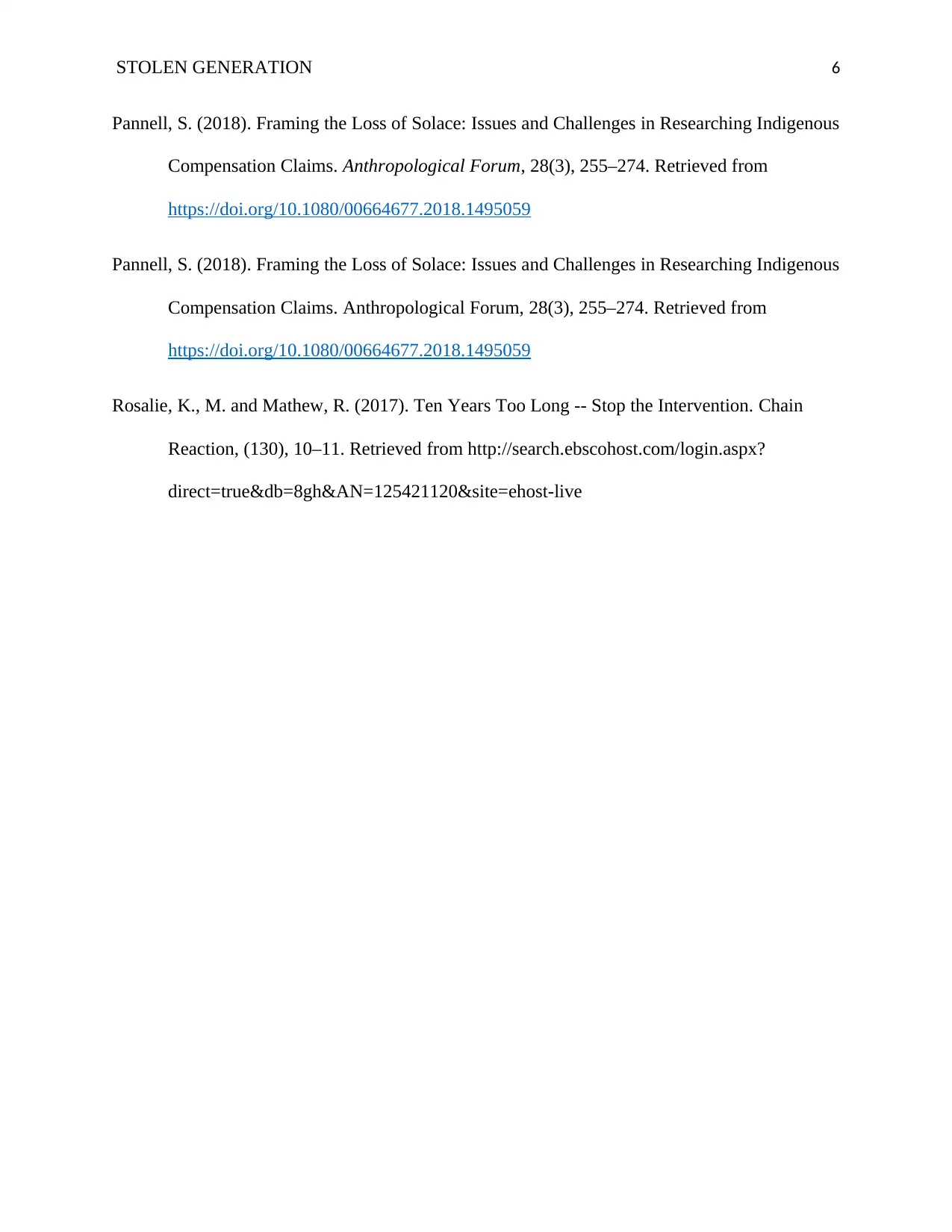
STOLEN GENERATION 6
Pannell, S. (2018). Framing the Loss of Solace: Issues and Challenges in Researching Indigenous
Compensation Claims. Anthropological Forum, 28(3), 255–274. Retrieved from
https://doi.org/10.1080/00664677.2018.1495059
Pannell, S. (2018). Framing the Loss of Solace: Issues and Challenges in Researching Indigenous
Compensation Claims. Anthropological Forum, 28(3), 255–274. Retrieved from
https://doi.org/10.1080/00664677.2018.1495059
Rosalie, K., M. and Mathew, R. (2017). Ten Years Too Long -- Stop the Intervention. Chain
Reaction, (130), 10–11. Retrieved from http://search.ebscohost.com/login.aspx?
direct=true&db=8gh&AN=125421120&site=ehost-live
Pannell, S. (2018). Framing the Loss of Solace: Issues and Challenges in Researching Indigenous
Compensation Claims. Anthropological Forum, 28(3), 255–274. Retrieved from
https://doi.org/10.1080/00664677.2018.1495059
Pannell, S. (2018). Framing the Loss of Solace: Issues and Challenges in Researching Indigenous
Compensation Claims. Anthropological Forum, 28(3), 255–274. Retrieved from
https://doi.org/10.1080/00664677.2018.1495059
Rosalie, K., M. and Mathew, R. (2017). Ten Years Too Long -- Stop the Intervention. Chain
Reaction, (130), 10–11. Retrieved from http://search.ebscohost.com/login.aspx?
direct=true&db=8gh&AN=125421120&site=ehost-live
⊘ This is a preview!⊘
Do you want full access?
Subscribe today to unlock all pages.

Trusted by 1+ million students worldwide
1 out of 6
Related Documents
Your All-in-One AI-Powered Toolkit for Academic Success.
+13062052269
info@desklib.com
Available 24*7 on WhatsApp / Email
![[object Object]](/_next/static/media/star-bottom.7253800d.svg)
Unlock your academic potential
Copyright © 2020–2026 A2Z Services. All Rights Reserved. Developed and managed by ZUCOL.





